Thailand judo scene
Technical. Physical. Fast. That’s how judo could be labeled in just three words. If you’ve ever found yourself in a dojo, or a training center, looking from the side at the judoka, or the judo practitioners, you would see skilled martial artists who use both their technique and physical strength to bring down an opponent. And then, all of a sudden, something happens, and one judoka is on the floor, locked in an inescapable chokehold. All you want to know is when you can start training!
If you live in Bangkok, then that’s easy, because there are at least three very good training facilities where you can join the Thais and the other expat judoka. The standard that you will find in these dojo is quite good, the fourteen medals that the Thai judo team brought home from the recent Southeast Asian Games stands as just one proof.
Judo, meaning “gentle way” in Japanese, was set up as a self-defense martial art by Jigoro Kano, a Japanese master who had previously studied ju-jutsu. Towards the end of the 19th century, judo as a discipline already had its governing headquarters at the Kodan Judo Institute in Tokyo. From here, with the help of various masters, judo became known worldwide and, in 1964, became an Olympic sport at the Summer Olympic Games in Tokyo. With the exception of 1968, judo has been present at each Olympiad ever since.
In 1964, Thailand sent three representatives to the judo Olympics but, unfortunately, they hadn’t brought home any medals, a fact which remains true until today. It is not surprising that Japan tops the judo Olympic medals tally chart, followed at a great distance by France and South Korea.
This year, one athlete will represent Thailand at the 2012 London Olympics. Having a world rank of 77, Homklin Teerawat has qualified for the Olympics in the under 100kg category after a competition organized by the Judo Union of Asia. He’s even had the chance of meeting Asif Ahmad, the British Ambassador in Bangkok who, during an activity organized by the Sports Authority of Thailand, had meet up with the Thai Olympian judoka and the national representatives for archery and windsurfing. Let’s hope that this year, out of the 14 judo medals available in London, one will be hung around Homklin Teerawat’s neck.
A judoka and their sensei, or instructor, must wear a special uniform called judogi. This consists of a cotton jacket and drawstring pants while a belt (obi) is used to fasten the jacket. If the belts can be of various colours (from white to black), depending on the rank of the practitioner, the judogi can be only white or blue. It is a distinction needed in order to be able to identify the two opponents in a competition.
French judoka in Bangkok
Jerome Le Louer is a 30-year-old French judoka who holds the 1st Dan Black Belt rank. He has been in Thailand since 2005 and has started training regularly in Bangkok five years ago. Jerome’s passion for judo began when he was only seven. “It was my first sport,” he remembered. “In France, judo is a very popular sport, just like soccer, so almost every French guy has done some judo at some point in their childhood. I liked judo a lot as every class was an opportunity to learn something new and I was good in competitions too, so that definitely gave me great motivation to go on.”
Jerome is now based in Bangkok where he is the CFO of Pronto Marketing, a company that provides Internet Presence Management solutions. He is training during weekdays at the dojo within the Hua Mark Stadium where most Thai national team members and RBAC students attend. The number of judoka he trains with varies a lot, from a few people to over twenty people when there’s a competition to prepare for. But, compared to his home country, “judo in Thailand is not as popular as in France, where there are roughly 600,000 players.”
Although Jermone is still fit and willing to compete, sadly there are not a lot of competitions in Thailand he can join. “In Thailand, I’m participating each year in maybe two university competitions plus an International Judo Tournament (this year it was held in June). Each year there are over ten countries participating, so it’s quite an interesting event.”
But Jerome does not limit himself to Thailand only. He also makes time to travel in the region to judo tournaments held in Vietnam and Indonesia, countries that organize tournaments each year. He has recently returned from Hanoi where he won the silver medal in the under 90kg category at the Hanoi International Judo Open 2012. This was not a surprise to those who know Jerome. Last year he won the bronze at the Thai Judo Open, while in 2010 he got the gold at the judo tournaments held in Thailand and Indonesia. And the list of medals goes on and on, all the way back to 2008.
Jerome confessed that, although judo is relatively popular in Thailand, “it’s difficult for players to improve (even the national team) as they’re not participating in a lot of competitions, and Thais don’t have enough quality coaches that teach technique. A standard training session in Thailand follows the same pattern: warm up – fitness – self-practice – fights. This is good because you get a good condition and do some randori (fights), but as far as I’m concerned, my judo is not improving that much. I’m fighting with the same guys that I have known for years over and over, and there’s no new techniques taught so it’s sometimes frustrating.”
Thai fighters have good basics and great potential, but it is true that without more technique and more international exposure, it will be difficult for them to reach the next level. “If you consider the regional competitions like the SEA Games, they’re doing very well, reaching the podium in most categories, but they don’t do much at the Asian Games because they meet players from the Middle East, Korea and Japan who are great judo fighters, with a lot of techniques and experience in competition.”
Speaking of the benefits of judo, Jerome said that, “Judo is for anyone, but the younger you start the better. It’s a lot about sensations, and how you manage your opponent’s strength in a fight to win. Technique is quite wide, with a lot to learn, and I believe that it might be one of the sports where you can’t know it all, you always have something to learn. And, in competition, you’ll always find someone who’s better than you.”
British judoka in Chinag Mai
Nigel Crofts, a 63-year old retired British national, is a 6th Dan Black Belt (Rokudan – Red and White Belt) who has been training in Thailand for the last nine years. He lives in Chiang Mai, but he returns to the UK several times a year to teach judo there too. He has been practicing judo since 1960 and, although he doesn’t compete anymore, as normal contesting ceases at 35 years old, he has more than enough experience under his belt.
Referring to the judo movement in Thailand, Nigel said: “Unfortunately judo is a minority sport in Thailand. As an outsider, it is difficult to form any opinion as to whether there is any judo movement in Thailand. Certainly most of the universities in Bangkok have judo clubs. In Chiang Mai there are only three clubs. To put this in perspective, in the city (of the same size as Chiang Mai) where I live in the UK, there are at least ten clubs, each club having about fifty-sixty members. The club I left behind when I came to Thailand had two hunted members practicing judo!”
In Chiang Mai, Nigel trains in all these three dojo which are located within Chiang Mai University, Rajabaht University, and the MMA Club Chiang Mai. At the MMA Club, there are only a few judoka training under his supervision, while the two university clubs have about twenty practitioners.
Speaking of the biggest difference between judo in Thailand and judo in Europe, Nigel confessed that, “judo is far more popular in the UK, but judo was really at its zenith in the 1960s and 1970s. Judo in the UK is far more structured with clearly defined objectives to achieve each grade. You also need additional qualifications, such as, Fundamental Principles of Judo, First Aid, and police clearance to work with children and additional coaching qualifications to achieve the 1st Dan Black Belt. Also, at your 1st Dan (the first Black Belt), you would be considered to have only just started. Most people’s perception is that you have reached mastery of judo when in fact it is completely the opposite.”
Where to train
In Bangkok, there are three training places where you can fine-tune your judo skills. The first one, where the Thai national team trains, is located on the third floor of the Sports Science Center in the Hua Mark Sports Complex on Ramkhamhaeng Road. Training starts daily at 6pm and lasts until 8am, with the exception of Sunday and Monday when the dojo is closed. Classes are free of charge. Check out their official website at www.judothailand.com (Thai only).
The second one is at Thai-Japanese Sport Complex (or Thai-Ippun as it is known by locals) in Din Daeng area, where you can train every Saturday and Sunday from 5pm to 7pm or 4pm to 6pm respectively. There are also weekday classes between 4pm and 6pm. Registration is 40 baht/year (one photo and passport copy needed for initial registration).
The third dojo is located within the training areas of National Stadium (near the National Stadium BTS station). Doors open at 6pm and you can train until 9pm every day from Monday to Friday.
If you live in the north of Thailand, then you might want to check out the dojo where Nigel is training in Chiang Mai. The MMA Club is located near the railway station. You can find out more about them on Facebook.
In Neigel Crofts’s opinion, “Judo is a difficult sport to take up. Both physically demanding and at time progress can seem very slow compared to other martial arts. But to some people this is the very reason to take up the sport.” At the same time, Jerome Le Louer is of the opinion that “Judo gives you a healthy and complete body because all parts of your body need to be trained to be a good player. Judo is also teaching great values like respect, humility, and self-control, which we all need in our daily lives.”
Judo in Thailand also has a fan page.
Originally published in “Bangkok Trader” (Vol. 6, No.8, July 2012)
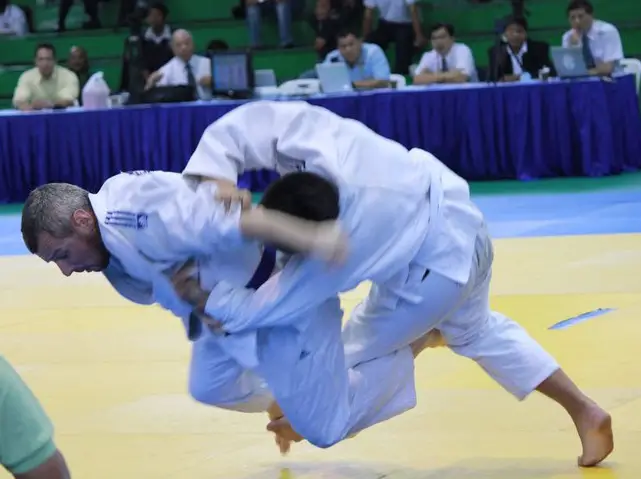
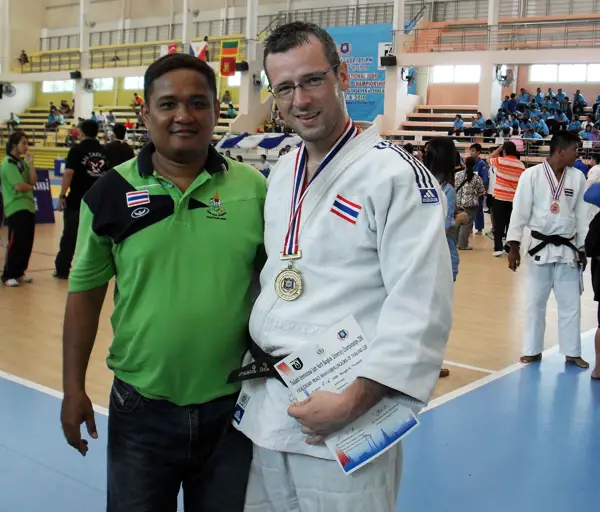
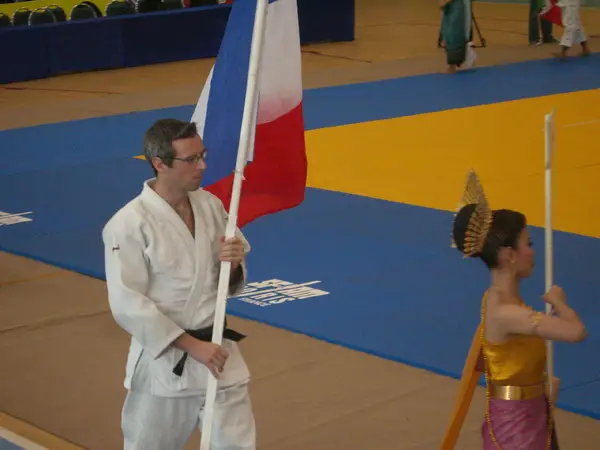
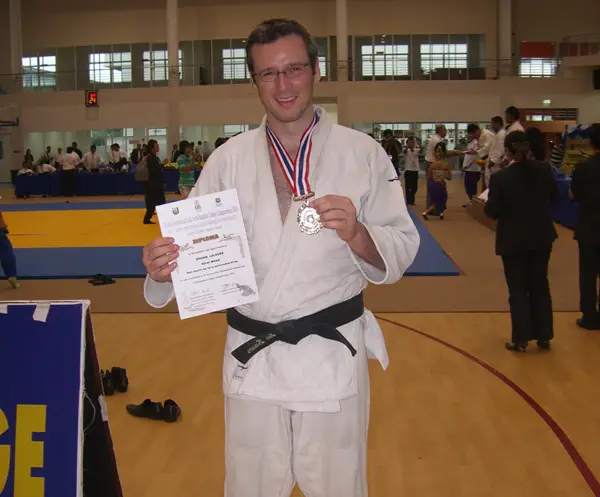
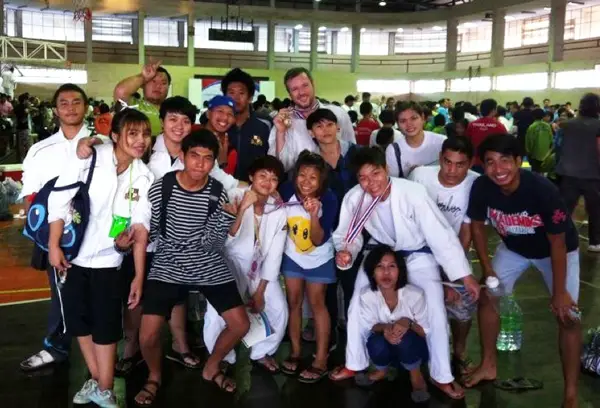
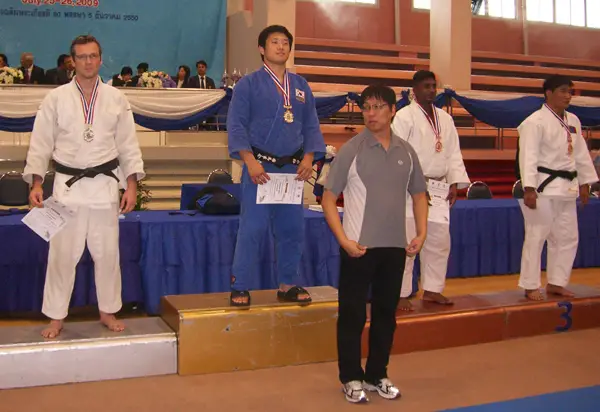


An interesting article from the perspective of a Judoka based in Chiang Mai. Reasonably accurate in terms of it’s desrciption of Judo in Chiang Mai.
At least one statement is incorrect. This is the calling the MMA club Nigel Croft’s Dojo. We train together. It is not Nigel’s Dojo, it is our club. If it were Nigel’s Dojo, I am confident that it would be of higher standards than it currently is. Also, there is not much on the east bank of the ping river, certainly not the MMA Club.
It is not responsible of you to publish an article like this with an error such as this that has possible ramifications of a very serious nature.
@Daron: Thank you for your feedback and clarifications. I’ve made the corrections.
As with regards to not being responsible of me to publish “an article like this”, all I can say is that I am trying to promote sports and martial arts in Thailand. The “possible ramifications” that I see are maybe that more people will become interested in sports (and judo) and maybe more people will start practicing.
by (thai only), do you mean the website is in thai?
my thai is excellent, so that wouldn’t be a problem.
but it seems like the website is down at the moment.
but if (thai only) means foreigners aren’t welcome to enter their judo club, well, that would suck.
@mike: Yes, their website was in Thai only and at the time when I wrote the article it was still online. It’s seems it’s no longer. I hope this is temporary.
But, you’re still welcome to join their training sessions. Their doors are open to all nationalities.
Thank you for this article, I am about to spend a year or so in the SEA area and will be looking for Judo clubs to train at.
I’ll be staying in both Bangkok and Chiang Mai for significant periods of my time over there, so it’s great to know there are clubs there.
Just one thing, Judo isn’t a martial art, it’s a sport 😉
@Adam: Your comment that “Judo isn’t a martial art, it’s a sport” is debatable.
Here are two definitions:
sport – An activity involving physical exertion and skill in which an individual or team competes against another or others.
martial art – any of several Oriental arts of weaponless self-defense; usually practiced as a sport.
As you can see, it depends on the judoka. I never participated in a judo competition, but I did practice judo just because I loved it as a martial art.
So, for me JUDO IS a MARTIAL ART.
Very nice article!
Thanks,
Regards,
Frank,
The Netherlands.
I just visited Ramkhamhaeng University yesterday in search of the judo team training there. I only saw a small class, mainly kids, and the instructor said that the Thai national team will move their training to Rangsit University starting in February. And they will take January off and won’t restart training until February. Voicu… could you or your sources verify if this is true. And if it’s true, where is the exact location the training will be held at? I was really looking to start training in judo again soon. I found it odd a little, that they will take a whole month off from training. Usually they’ll just do light training if they need a break. Strange.
Anyways, and info would be greatly appreciated.
Thanks.
Yes, Scott you’re right. At the moment, there’s no training at the Hua Mark dojo (the one near Ramkhamhaeng University), but each club holds sessions in their university dojos. You can join the one at RBAC if you want.
Hi Guys
Please help, I’m looking for a judo club in the Pattaya area.
I can find nothing 🙁
Ditto Stevens question, does anyone know of a judo dojo in Pattaya please i would love to join
Hey guys,
If you’re in Pattaya then you might want to join the dojo at the Chonburi Sports School. Here’s their website: http://www.cbss.ac.th . If you can’t read Thai, look for the contact info at the bottom of their webpage.
Good luck.
Thanks for this info. Looking forward to continuing my judo when I get to Bangkok. It is hard to find many websites for these clubs but will definitely train at one of them.
Thanks
Neat article! I trained a bit at Huamak stadium in summer 2011 (where the national team guys and Jerome wiped the mats with me!), is there still regular training there? Last time I was in BKK and trained at Thai-Nippon (a year ago), folks told me there wasn’t any training there now. Where is training in National Stadium (near MBK)? Also any classes in Chulalongkorn University? Would love more options when I visit Thailand than only the saturday session at Thai-Nippon. My Thai is non-existent so conversations with the guys at Thai-Nippon is understandably limited. Thank you!
– The dojo at National Stadium is right there, inside the stadium.
– University clases are still going on (RBAC, Chula).
– Hua Mark dojo will be open again with the Thai national team training there once the selection for the SEA Games 2013 is done.
Thanks for the additional info, will be useful when I’m in BKK next. Did train in Thai-Nippon again last weekend and was told Thailand will be hosting this year’s Asian Judo Championships, April 19-21, 2013. I’m trying to see if there’s any way I can make it to BKK then so I can watch some top-class Judo competitive action 🙂 http://www.onlinejua.org/eventsdet.php?pid=78
I was wondering g where my 11 y/o son can start judo lessons with other kids his age? He does not speak Thai. Also, any idea where to buy kids’ Judo gi’s?
@Lornebjj: Children can also join the dojo at Hua Mark and Din Daeng. Judo gi’s are available in all sizes (and very affordable) at FBT shopping mall, opposite Hua Mark Sport Complex in the corner of 65 Ramkhamaeng Rd.
Well to me Martial Arts means respect and discipline.
I have trained in different Martial arts now for well over 20 years.
I have seen various people stick around but one more
thing that I have noticed is the respect and discipline that has changed those peoples perception of life.
Young children that have started which were on the wrong
side of the tracks, always in trouble and no idea how to respect other kids.
Place them in a controlled environment with
discipline and fighting and they soon start to understand.
Martial arts is one way for teens and adults to get rid of their aggression without hurting
or bullying anyone.
The place where you have the highest chance to find training is Thai Japanese Center on Saturdays starting 5pm. I heard there’s regular training at Chulalongkorn University, though I’ve never been there.Training at other facilities depend on a lot of factors.
I’m going to visit Thailand in january 2014 and I would like to participate at a lokal judo training. Can anyone tell where I should go for a good judo training?!
I’ve been practicing judo for over 20 years now at a international level.
And is it also possible te borrow a Judogi? Because i’m comming with my backpack I won’t be able to bring my own.
@Selena:
– Judo in Bangkok: Thai-Japanese Center on Saturdays starting 5pm.
– You can buy a judogi here in Thailand and then donate it if you don’t want to carry it back home.
Is there any chance anyone could give a rundown on dojo’s in BKK, days and times they train and rough number of Judoka training?
Many seem to be off the beaten track (BTS) and difficult to get to from places like Bangna.
@bmouthboyo: Read the article and the previous comments!
Hello
My little girl who is french but understand little thai, like to practice judo during holidays, any address dojo in BKK.
Thanks a lot, have a nice X mass.
Arnaud
@ Arnaud: You’ve got all the information in the article above. Just read it!
Hi, I am looking for judo class for my children in Hatyai. Appreciate your recommendation.
Thanks